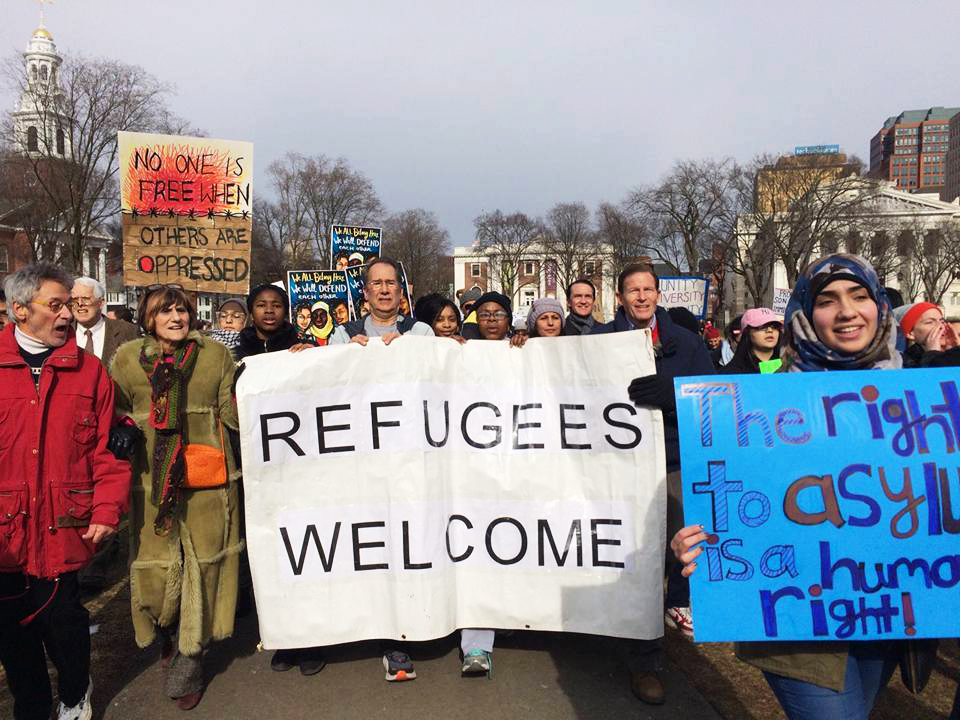
Courtesy of IRIS
New Haven-based advocacy organization Integrated Refugee and Immigrant Services has initiated a phone banking campaign to fight against a revised executive order, signed by President Donald Trump on March 6, that continues the 90-day ban on the entrance of citizens from six predominantly Muslim nations.
Anne O’Brien, director of community engagement at IRIS, said that though the organization received an outpouring of support after the announcement of the initial travel ban on Jan. 27, she has noticed less of an impetus to engage after the revised order. That decrease in energy, O’Brien said, is the main push for the phone campaign, which aims to make 60,000 phone calls on behalf of 60,000 refugees. Though Iraq was removed from the banned countries list in the new order, the same core tenets remained, in addition to a new directive that seeks to reduce the number of refugees to be admitted into the country this year from 110,000 to 50,000 — the lowest number that any U.S. president has ever committed to, according to IRIS’s website.
“The United States will turn its back on 60,000 refugees whom it promised to protect — over half of whom are children,” read a statement from IRIS. “This is at a time when the world is experiencing the largest refugee crisis since World War II. The impact will be felt for years to come.”
As part of the phone banking campaign, IRIS’s website homepage now features a call to action to viewers, and has documents with instructions on how to effectively call state legislators. The website also features a tracker with the number of calls already made as part of the campaign. Seven-hundred and seventy-three calls to Congress have been made on behalf of the refugees affected by the executive order through the IRIS phone banking campaign as of Thursday night.
The phone banking campaign seeks primarily to bring attention to the back two-thirds of the directive, which calls for a reduction in refugees accepted to the country as well as the suspension of the refugee resettlement program for 120 days. Though the March 6 order was blocked by Judge Derrick Watson of the United States District Court in Honolulu just hours before it was to be enacted on March 15, preventing the order from being enacted nationwide, the effects of the resettlement suspension were immediate. New Haven-based IRIS, in particular, suffered a cut in funding during the initial legal battle. Previously on track to receive over 500 refugees this year, IRIS has not received a refugee since January, according to O’Brien.
And though Watson further extended the blockage on the revised order on March 29, O’Brien emphasized that temporary blockage by the judicial branch is not enough. To get executive power to yield, she said the legislature must also take action.
“The courts can put the order on hold, but only Congress can fund the program,” O’Brien said. “Even if the courts win … if Congress doesn’t make sure that the money is there to pay for the refugees to come, then they still can’t come. The only way Congress is going to listen is if the people tell them that.”
Maria Melchor ’18, president of the Yale Refugee Project, also expressed concern over the revised ban. Though funding for YRP will not be impacted by this new ban, as it is privately funded by the University, Melchor said she has seen the effects of the order on the refugees she has personally worked with.
“It is creating this well-founded fear that refugees are not welcome here,” Melchor said. “It emphasizes their fear that their relatives or friends abroad who qualify for refugee resettlement or were possibly already in the process of coming to America will no longer be able to come.”
O’Brien expressed similar sentiments, and highlighted an overwhelming sense of initial shock among the refugee population already settled and newly settled in New Haven. Questions about wearing a hijab, eschewing religious traditions and having to relocate once more have emerged among the refugees, she said.
However, O’Brien also spoke about a new strength and willingness to share experiences and stories coming from refugees who had previously stayed silent in fear of retribution or persecution. She said this stems from a belief that America is different and that “now is their time to step up and exercise their rights.”
IRIS was founded in 1982.







